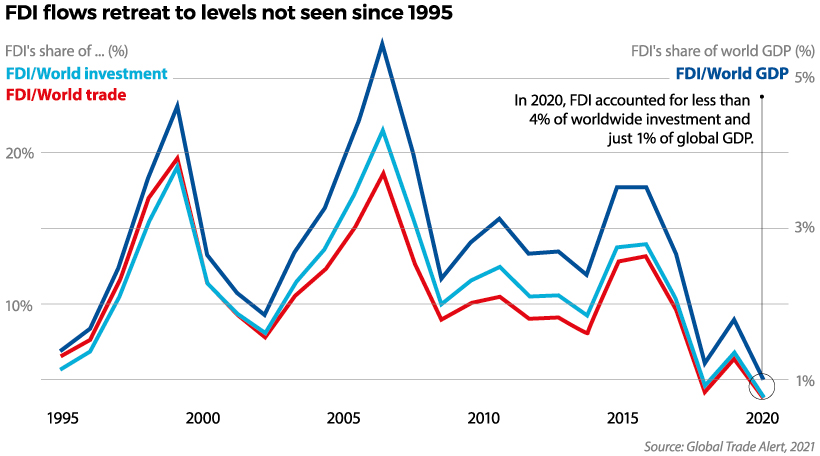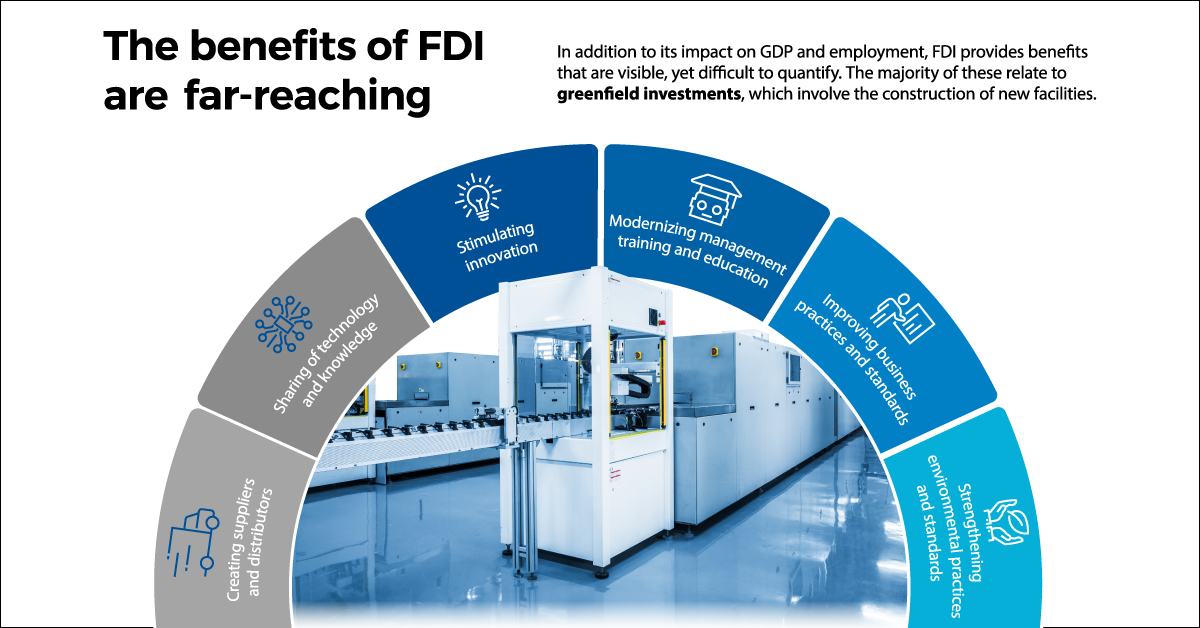The Importance of FDI and Why It Must Be Revived
The following content is sponsored by the Hinrich Foundation.

The Importance of FDI and Why It Must Be Revived
Foreign direct investment (FDI) has long been a hallmark of globalization, helping to transform entire firms, cities, sectors, and economies. For evidence of this, we look no further than China.
Attracting cumulative net inflows of $3.5 trillion since 1979 has enabled the country to grow its GDP by almost 8,000%. Over a similar time frame, China has also lifted 700 million citizens out of poverty.
Despite all of the benefits that FDI can deliver, global investment flows have been in a downward trend since the Global Finanicial Crisis of 2009. Our sponsor, the Hinrich Foundation, puts this collapse into perspective.
The Decline of FDI
The COVID-19 pandemic took a heavy toll on FDI in 2020, especially in terms of greenfield investment. These investments involve the construction of new facilities in foreign countries.
| Region or Country | Change in Greenfield FDI* (%) |
|---|---|
| Developing countries | -56% |
| East Asia & Pacific | -47% |
| China | -59% |
| Brazil | -16% |
| India | -10% |
*Year-on-year decrease in the fourth quarter of 2020.
Within developing economies, FDI decreased the most in China as it was the first country to suffer a COVID-19 outbreak. For Brazil and India—two countries which experienced major outbreaks in 2021—FDI is expected to be fall much further.
Taking a long-term view, however, exposes an even greater issue.

With investment dropping to multi-decade lows, it seems that FDI has become less attractive than it once was.
Identifying the Forces Behind the Decline
Across levels of economic development, public policy mixes are becoming less conducive to inward FDI—investments made in a domestic market by foreign entities.
This coincides with a rise in protectionist attitudes by governments around the world. In India, for example, Amazon and Walmart face restrictions that do not allow them to hold any inventory. The country also imposes data localization measures that make it difficult for companies to operate efficiently.
As a result of these types of measures, the Economic Policy Uncertainty Index has trended significantly higher than it has in previous years.
Another contributing factor to FDI’s collapse is a rise in geopolitical rivalries, particularly between Western economies and China. Since 2015, over 60 foreign governments including Australia, Canada, the United States, and the UK have taken action against Chinese FDI projects.
In many cases, national security is at the center of these disputes.
Changing the Course
For decades, FDI has been a proven mechanism for transferring better practice, capital, and technology around the globe. In addition to boosting GDP and reducing poverty, it has the potential to:
- Create new supply chains
- Promote knowledge sharing between economies
- Stimulate innovation
- Modernize management training and education
- Improve business practices and standards
- Strengthen environmental practices and standards
Nonetheless, governments continue to demand more from international businesses, often calling for higher quality FDI—investments that do more to advance sustainable development and tackle climate change.
Despite these demands, businesses are facing numerous obstacles when attempting to enter foreign markets. This has the knock-on effect of diminishing the financial returns that FDI can generate.
Moving forward, increased cooperation between the public and private sectors is likely to play a key role in reviving FDI’s appeal.
-

 Sponsored3 years ago
Sponsored3 years agoMore Than Precious: Silver’s Role in the New Energy Era (Part 3 of 3)
Long known as a precious metal, silver in solar and EV technologies will redefine its role and importance to a greener economy.
-

 Sponsored7 years ago
Sponsored7 years agoThe History and Evolution of the Video Games Market
Everything from Pong to the rise of mobile gaming and AR/VR. Learn about the $100 billion video games market in this giant infographic.
-

 Sponsored8 years ago
Sponsored8 years agoThe Extraordinary Raw Materials in an iPhone 6s
Over 700 million iPhones have now been sold, but the iPhone would not exist if it were not for the raw materials that make the technology...
-

 Sponsored8 years ago
Sponsored8 years agoThe Industrial Internet, and How It’s Revolutionizing Mining
The convergence of the global industrial sector with big data and the internet of things, or the Industrial Internet, will revolutionize how mining works.


